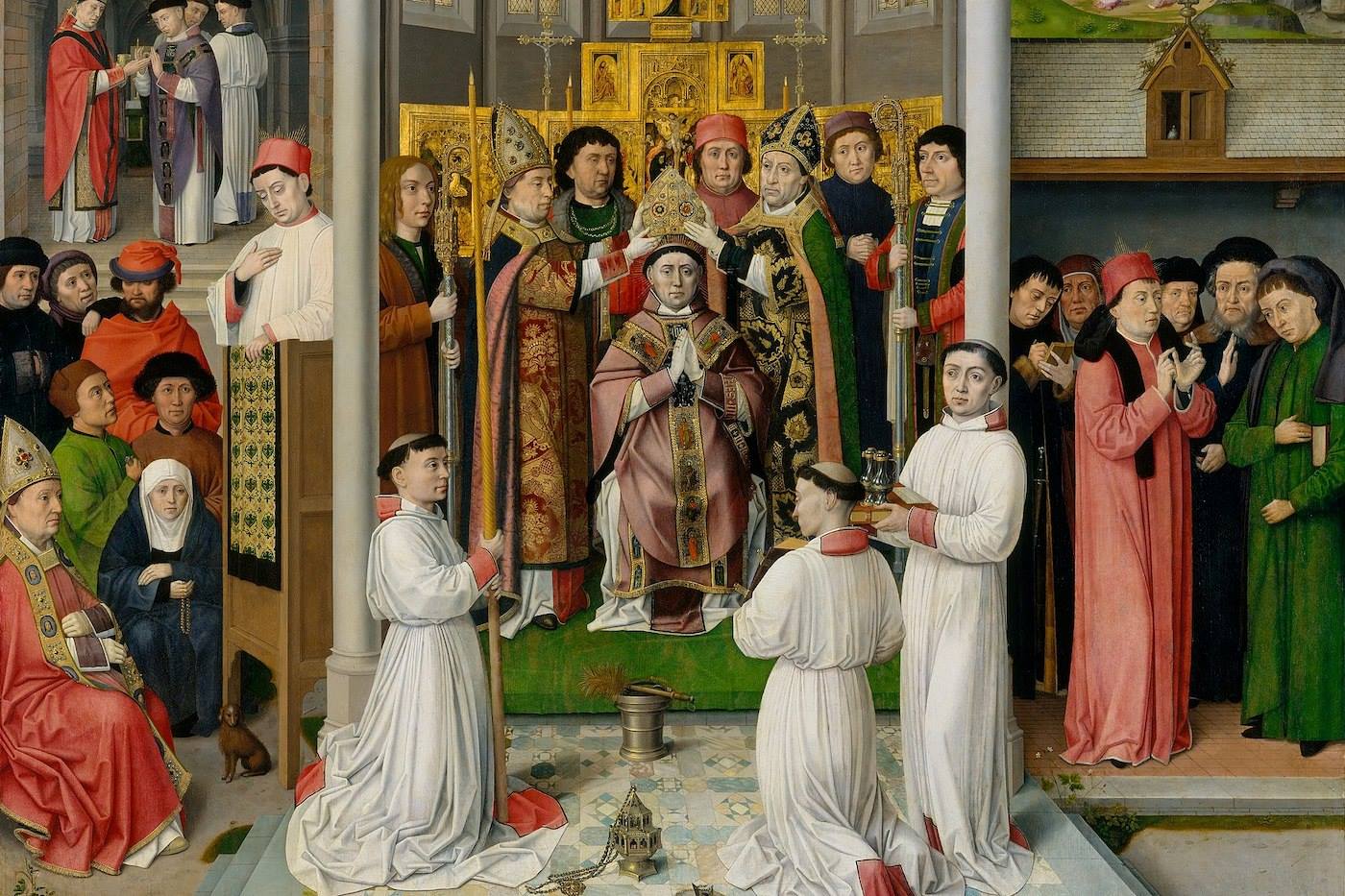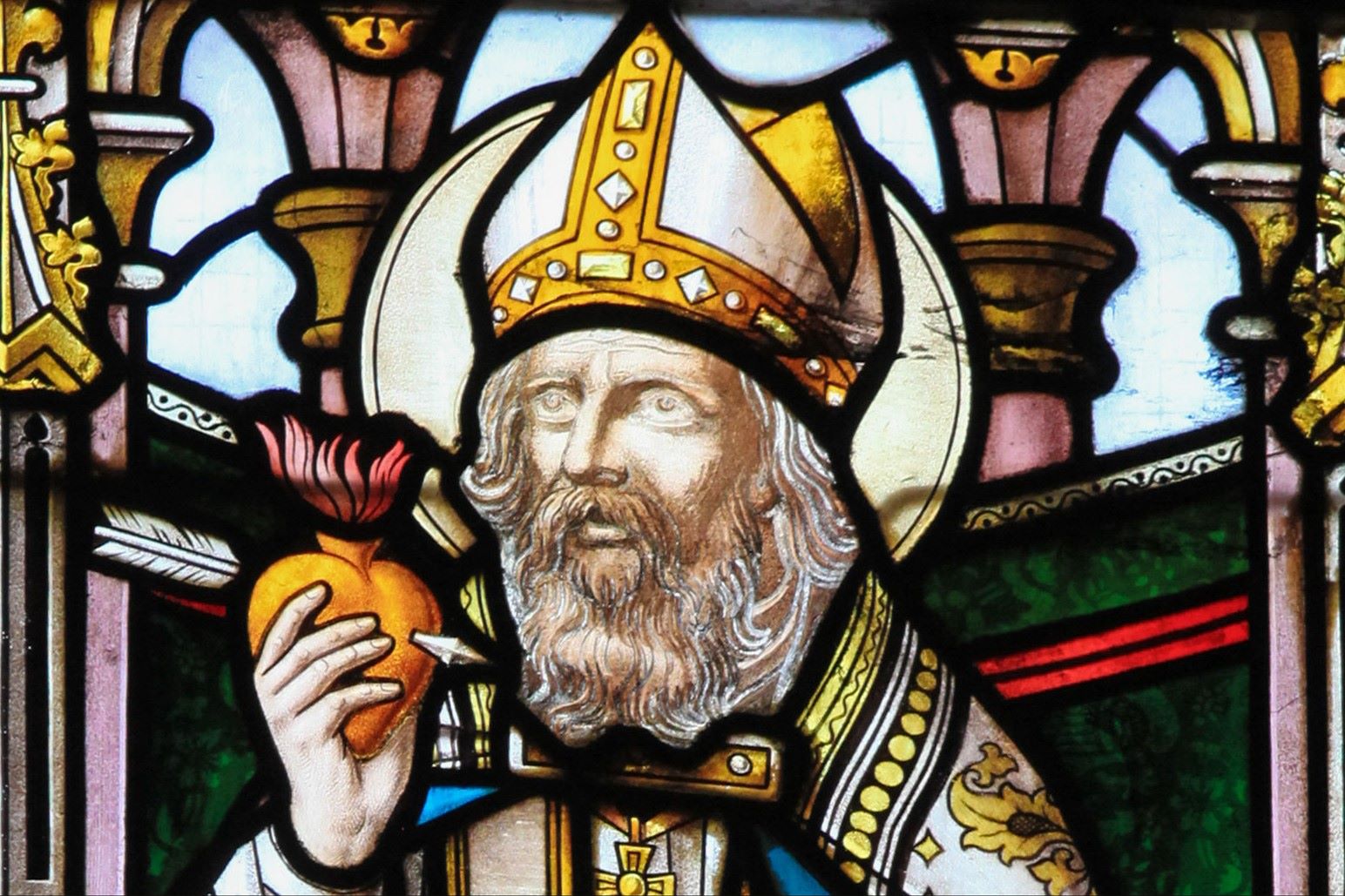Home>Theology and Spirituality>When Did Augustine Come To England


Theology and Spirituality
When Did Augustine Come To England
Published: February 10, 2024
Peter Smith, Editorial Director at Christian.net, combines deep insights into faith, politics, and culture to lead content creation that resonates widely. Awarded for his contributions to religious discourse, he previously headed a major organization for religious communicators, enhancing dialogue on faith's societal impacts.
Discover the arrival of Augustine in England and his impact on theology and spirituality. Explore the historical significance and influence of Augustine's mission.
(Many of the links in this article redirect to a specific reviewed product. Your purchase of these products through affiliate links helps to generate commission for Christian.net, at no extra cost. Learn more)
Table of Contents
Introduction
The arrival of Augustine of Canterbury in England marks a pivotal moment in the history of Christianity in the British Isles. Augustine, a renowned theologian and missionary, played a significant role in spreading Christianity throughout England and establishing the Church in the region. His mission, which took place during the 6th century, not only transformed the religious landscape of England but also left a lasting legacy that continues to influence spiritual practices and beliefs to this day.
Augustine's journey to England was not merely a geographical voyage; it represented a profound spiritual undertaking that would shape the future of Christianity in the region. His arrival heralded a new era of religious fervor and theological discourse, as he sought to bring the message of Christianity to the Anglo-Saxon kingdoms of England.
The story of Augustine's mission is one of unwavering faith, cultural exchange, and the triumph of spiritual conviction over adversity. It is a tale that resonates with the timeless themes of human endeavor, perseverance, and the enduring power of faith to transcend boundaries and unite diverse communities.
As we delve into the details of Augustine's mission to England, we will unravel the complexities of his historical context, the challenges he faced, and the remarkable achievements that emerged from his tireless efforts. Through this exploration, we will gain a deeper understanding of the profound impact Augustine had on the spiritual fabric of England and the enduring significance of his legacy in shaping the religious identity of the nation.
The narrative of Augustine's arrival in England is not merely a historical account; it is a testament to the enduring influence of spirituality and the transformative power of individuals who are driven by a profound sense of purpose. By delving into this remarkable chapter of history, we can glean valuable insights into the interplay between faith, culture, and the indomitable human spirit, which continue to resonate with contemporary audiences seeking to understand the roots of Christianity in England.
Read more: When Did Augustine Write
Augustine's Early Life and Conversion
Augustine of Canterbury, also known as Saint Augustine, was born in the year 540 AD in the region of Roman North Africa, which is present-day Algeria. His early life was marked by a pursuit of knowledge and a deep intellectual curiosity. Augustine received a classical education and demonstrated exceptional aptitude in rhetoric and philosophy, distinguishing himself as a skilled orator and thinker.
Despite his intellectual prowess, Augustine's spiritual journey initially led him to embrace Manichaeism, a dualistic religious sect that espoused a stark division between the forces of good and evil. However, his quest for spiritual truth eventually led him to encounter the teachings of Christianity, which would profoundly alter the course of his life.
The pivotal moment in Augustine's spiritual transformation occurred during a period of intense introspection and inner turmoil. Through the influence of his mother, Monica, and the renowned bishop Ambrose of Milan, Augustine underwent a profound conversion experience, renouncing his former beliefs and embracing the Christian faith with unwavering conviction.
This conversion marked a turning point in Augustine's life, as he embarked on a path of theological inquiry and spiritual devotion. His intellectual acumen and newfound faith converged as he delved into the study of Christian doctrine and theology, ultimately emerging as one of the most influential theologians in the history of the Church.
Augustine's early life and conversion exemplify the profound impact of personal transformation and the enduring power of faith to illuminate the path of individuals. His journey from intellectual inquiry to spiritual enlightenment serves as a testament to the transformative potential of embracing a higher purpose and seeking truth beyond the confines of conventional wisdom.
The seeds of Augustine's spiritual calling were sown in the fertile soil of his intellectual pursuits and inner quest for meaning. This formative period in his life laid the groundwork for the remarkable mission that awaited him, as he would later be called upon to carry the message of Christianity to distant lands and leave an indelible mark on the religious landscape of England.
Mission to England
Augustine's mission to England was a defining moment in the spread of Christianity beyond the boundaries of the Roman Empire. In 595 AD, Pope Gregory the Great, recognizing the spiritual potential of the Anglo-Saxon kingdoms, dispatched Augustine and a group of missionaries to embark on a daunting journey to England. Their mission was twofold: to re-establish Christianity in the region and to bring the message of salvation to the pagan Anglo-Saxons.
The task that lay before Augustine was formidable. England, comprising a patchwork of Anglo-Saxon kingdoms, was a land steeped in pagan traditions and religious practices that stood in stark contrast to the tenets of Christianity. Undeterred by the challenges that awaited them, Augustine and his companions set out on a perilous voyage across the sea, carrying with them the hopes of a burgeoning faith and the weight of a sacred mandate.
Upon their arrival in England, Augustine and his fellow missionaries encountered a complex tapestry of tribal allegiances, cultural customs, and religious beliefs that posed significant obstacles to their mission. Yet, driven by unwavering faith and a steadfast commitment to their calling, they embarked on a journey of evangelization that would shape the destiny of Christianity in England.
The mission to England was not merely a geographical expedition; it represented a profound spiritual endeavor to bridge the chasm between disparate belief systems and illuminate the hearts and minds of the Anglo-Saxon people with the light of Christian truth. Augustine's approach was characterized by a blend of humility, resilience, and a deep understanding of the cultural nuances that defined the socio-religious landscape of England.
As the missionaries traversed the length and breadth of the land, they engaged in dialogue with tribal leaders, sought to understand the customs and traditions of the Anglo-Saxons, and endeavored to convey the message of Christianity in a manner that resonated with the cultural sensibilities of the people. Their efforts were marked by a spirit of adaptability and a genuine desire to forge meaningful connections with the communities they encountered.
The mission to England was a testament to the transformative power of faith and the indomitable spirit of individuals who are driven by a sense of divine purpose. Augustine's unwavering commitment to his mission, coupled with his profound theological insight, laid the groundwork for the establishment of Christianity in England and set in motion a series of events that would shape the religious identity of the nation for centuries to come.
Arrival in England
Upon reaching the shores of England, Augustine and his companions were met with a landscape that bore witness to a rich tapestry of tribal allegiances, cultural customs, and religious beliefs. The Anglo-Saxon kingdoms, comprising disparate communities with their own distinct traditions, presented a formidable challenge to the missionaries' endeavor to establish Christianity in the region.
Undeterred by the daunting task that lay before them, Augustine approached the complexities of the English socio-religious milieu with a blend of humility, resilience, and a deep understanding of the cultural nuances that defined the fabric of the land. His arrival in England marked the beginning of a profound dialogue between the message of Christianity and the deeply ingrained customs and beliefs of the Anglo-Saxon people.
As Augustine and his fellow missionaries ventured into the heart of England, they sought to engage in meaningful interactions with tribal leaders and members of the community, endeavoring to comprehend the intricacies of the local customs and traditions. This approach reflected a genuine desire to establish connections with the Anglo-Saxon people, recognizing the importance of forging relationships based on mutual respect and understanding.
The missionaries' arrival in England was not characterized by a unilateral imposition of religious doctrine, but rather by a spirit of adaptability and a willingness to convey the message of Christianity in a manner that resonated with the cultural sensibilities of the populace. Augustine's astute awareness of the need to bridge the gap between the Christian faith and the existing belief systems of the Anglo-Saxons underscored the depth of his commitment to fostering a meaningful dialogue that transcended cultural barriers.
The arrival of Augustine in England marked the inception of a transformative journey that would ultimately lead to the establishment of Christianity in the region. His approach to engaging with the diverse communities of England reflected a profound understanding of the power of dialogue, empathy, and cultural exchange in the propagation of the Christian message. This pivotal moment in history set the stage for a series of interactions and encounters that would shape the religious landscape of England and lay the foundation for the enduring legacy of Augustine's mission.
The missionaries' arrival in England was not merely a geographical event; it was a spiritual odyssey that embodied the timeless themes of human connection, cultural understanding, and the transformative power of faith. Augustine's presence in England heralded the dawn of a new era, one in which the seeds of Christianity would take root in the fertile soil of the Anglo-Saxon kingdoms, ultimately blossoming into a vibrant and enduring legacy that continues to resonate with the spiritual identity of the nation.
Establishment of the Church in England
The establishment of the Church in England represents a watershed moment in the history of Christianity, marking the culmination of Augustine of Canterbury's tireless efforts to bring the message of the Christian faith to the Anglo-Saxon kingdoms. Augustine's unwavering commitment to his mission, coupled with his profound theological insight, laid the groundwork for the enduring legacy of the Church in England.
Upon their arrival in England, Augustine and his fellow missionaries embarked on a multifaceted endeavor to establish the presence of Christianity in the region. Their approach was characterized by a deep understanding of the cultural nuances and religious sensibilities of the Anglo-Saxon people, reflecting a genuine desire to forge meaningful connections with the communities they encountered. This approach was pivotal in laying the groundwork for the acceptance and integration of Christianity within the socio-religious fabric of England.
One of the pivotal moments in the establishment of the Church in England was Augustine's encounter with King Ethelbert of Kent. Through a series of dialogues and interactions, Augustine succeeded in gaining the king's favor and ultimately secured his support for the Christian mission. Ethelbert's conversion to Christianity, along with the subsequent baptism of a significant number of his subjects, marked a turning point in the acceptance of the Christian faith within the Anglo-Saxon kingdoms.
The establishment of the Church in England was further solidified through the founding of the Canterbury Cathedral, which served as a beacon of Christian worship and theological learning. This monumental edifice not only symbolized the physical presence of Christianity in England but also served as a center for spiritual guidance, religious instruction, and the cultivation of a vibrant Christian community.
Augustine's emphasis on the ordination of local bishops and clergy further contributed to the organic growth of the Church in England, fostering a sense of indigenous leadership and spiritual autonomy within the evolving ecclesiastical landscape. This approach facilitated the seamless integration of Christianity into the existing social and cultural frameworks of the Anglo-Saxon kingdoms, laying the groundwork for the enduring influence of the Church in England.
The establishment of the Church in England was not merely a top-down imposition of religious doctrine; it was a collaborative endeavor that sought to harmonize the message of Christianity with the cultural ethos of the Anglo-Saxon people. Augustine's astute awareness of the need to bridge the gap between the Christian faith and the existing belief systems of the Anglo-Saxons underscored the depth of his commitment to fostering a meaningful dialogue that transcended cultural barriers.
The enduring legacy of Augustine's mission is evident in the profound impact it had on shaping the religious identity of England. The establishment of the Church in England laid the foundation for a rich tapestry of Christian traditions, theological scholarship, and spiritual devotion that continues to resonate with the spiritual fabric of the nation. Augustine's vision and unwavering dedication to his mission left an indelible mark on the history of Christianity in England, shaping the destiny of the Church and inspiring generations of believers to embrace the transformative power of faith.
Read more: When Did Augustine Become A Saint
Legacy of Augustine's Mission
The legacy of Augustine's mission to England reverberates through the annals of history, leaving an indelible imprint on the religious, cultural, and intellectual landscape of the nation. Augustine of Canterbury's unwavering commitment to spreading the message of Christianity and establishing the Church in England yielded a legacy that transcends the confines of time, shaping the spiritual identity of the nation and inspiring generations of believers.
One of the most enduring legacies of Augustine's mission is the foundational role it played in shaping the ecclesiastical infrastructure of England. The establishment of the Canterbury Cathedral, a monumental edifice that served as a bastion of Christian worship and theological scholarship, stands as a testament to Augustine's vision of fostering a vibrant Christian community in England. The cathedral not only symbolized the physical presence of Christianity but also served as a center for spiritual guidance, religious instruction, and the cultivation of a rich tapestry of Christian traditions.
Furthermore, Augustine's emphasis on the ordination of local bishops and clergy contributed to the organic growth of the Church in England, fostering a sense of indigenous leadership and spiritual autonomy within the evolving ecclesiastical landscape. This approach facilitated the seamless integration of Christianity into the existing social and cultural frameworks of the Anglo-Saxon kingdoms, laying the groundwork for the enduring influence of the Church in England.
The legacy of Augustine's mission also extends to the realm of theological scholarship and intellectual discourse. Augustine's profound theological insights and his contributions to Christian doctrine continue to inspire theological inquiry and spiritual reflection. His writings and teachings have left an indelible mark on the development of Christian thought, influencing subsequent generations of theologians and scholars who have sought to grapple with the profound mysteries of faith and the complexities of Christian doctrine.
Moreover, Augustine's mission engendered a cultural and spiritual renaissance in England, fostering a climate of religious fervor, intellectual curiosity, and artistic expression. The impact of his mission reverberated through the corridors of time, shaping the artistic and literary heritage of England and infusing the nation's cultural tapestry with the enduring themes of Christian faith, moral reflection, and spiritual introspection.
The legacy of Augustine's mission endures as a testament to the transformative power of faith and the enduring influence of individuals who are driven by a profound sense of purpose. His mission to England not only established the Church in the region but also laid the groundwork for a rich tapestry of Christian traditions, theological scholarship, and spiritual devotion that continues to resonate with the spiritual fabric of the nation. Augustine's vision and unwavering dedication to his mission left an indelible mark on the history of Christianity in England, shaping the destiny of the Church and inspiring generations of believers to embrace the transformative power of faith.














